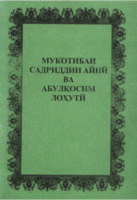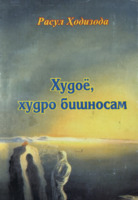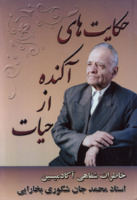Browse Documents (3 total)
Мукотибаи Садриддин Айнӣ ва Абулқосим Лоҳутй. The correspondence of Sadriddin Ayni and Abdulqosem Lahuti
From the publisher: Ин китоб аз мактубҳои ду устоди бузург, Қаҳрамони Тоҷикистон Садриддин Айнӣ ва Абулқосим Лоҳутӣ фароҳам омадааст. Мактубҳо қимати илмиву адабӣ ва таърихӣ доранд.
This is a collection of correspondence between two of Soviet Tajikistan’s most prominent writers: Sadriddin Ayni (1878–1954) and Abdulqosim Lahuti (1887-1957). While both became part of the Tajik literary pantheon, neither had their primary residence in the republic. Ayni spent most of his life in Samarqand, while Lahuti lived in Moscow with his wife, Cecilia Bonu. These letters, held at the Archive of the Rudaki Institute of Literature in Dushanbe, were first published during the Soviet era. This second, more complete edition, includes additional letters from the period of the terror, when Ayni in particular was put under a great deal of pressure. The publication was prepared and edited by Khursheda Otahonova.
This is a collection of correspondence between two of Soviet Tajikistan’s most prominent writers: Sadriddin Ayni (1878–1954) and Abdulqosim Lahuti (1887-1957). While both became part of the Tajik literary pantheon, neither had their primary residence in the republic. Ayni spent most of his life in Samarqand, while Lahuti lived in Moscow with his wife, Cecilia Bonu. These letters, held at the Archive of the Rudaki Institute of Literature in Dushanbe, were first published during the Soviet era. This second, more complete edition, includes additional letters from the period of the terror, when Ayni in particular was put under a great deal of pressure. The publication was prepared and edited by Khursheda Otahonova.
Худое, худро бишиносам To know oneself and to know God
From the publisher: Олим ва нависандаи маъруф Расул Ҳодизода дар китоби хотироташ ҳамзамон бо тасвири марҳилаҳои зиндаги ва фаъолияти худ дар бораи воқеахри таърихии илму маданият ва симохри шинохтаи адабиёт, илм ва фарх,анги тоҷик хркоятхри ҷолиб аз диду дили худ нақл намудааст. Чунонки муаллиф гуфтааст, ин китоб "еде аз саҳифаҳои таърихи замой ва одамон аст", ки 6а хонандаи имруз тақдим мешавад.
Rasul Hodizoda (1928-2010) was a writer, translator, and scholar. Born in Samarkand, he studied in Tashkent, worked briefly in radio, and later did graduate work in Moscow. Hodizoda spent most of his career at the Rudaki Institute in Dushanbe, but was also active in the Union of Writers and published in all-union publications such as Druzhba Narodov. These particularly detailed memoirs cover his childhood, education, and career. Hodizoda also provides detail on his experiences writing a novel about Ahmad Donish and his relationship with mentors like Sadriddin Ayni, Mikhail Andreev, and Aleksandr Semenov, as well as contemporaries like Muhamadjon Shakurov (Shakuri), Shavqat Niezi, Semen Lipkin, and Mikhail Zand.
حکایتها آکنده از حیات Stories full of life
Muhammadjon Shakuri (Shakurov) (1924-2012) was a Tajik philologist and academician. He studied at the pedagogical institute in Dushanbe and later earned his kandidatskaia and doktorskaia degrees at the Institute of World Literature in Moscow. His professional home, however, remained the Rudaki Institute of Language and Literature in Dushanbe. In the late 1980s he became a leading figure in the campaign for the primacy of the Tajik language. This volume, published in the Arabic/Persian script with the support of the Iranian Embassy in Dushanbe, includes accounts of raising Tajik-speaking children in a mixed family (his wife was Russian), his experience studying for a graduate degree, and his perestroika-era activism.


